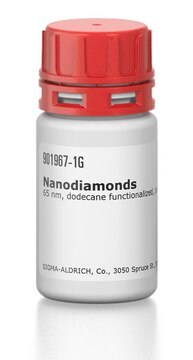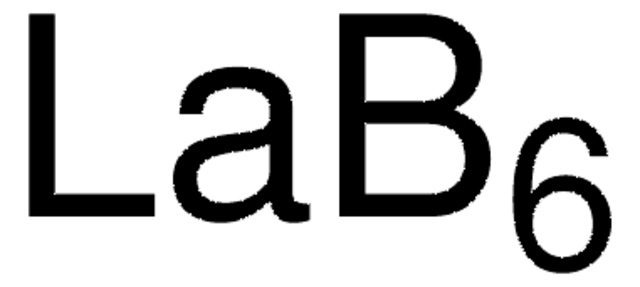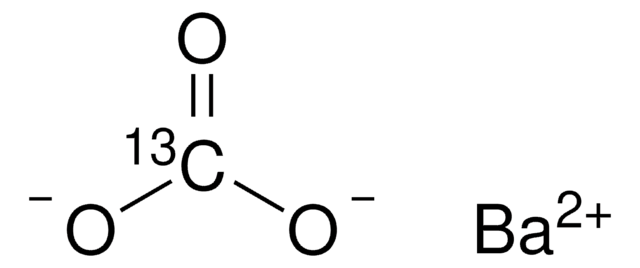636444
Diamond
nanopowder, <10 nm particle size (TEM), ≥95% trace metals basis
Sign Into View Organizational & Contract Pricing
All Photos(1)
About This Item
Empirical Formula (Hill Notation):
C
CAS Number:
Molecular Weight:
12.01
EC Number:
MDL number:
UNSPSC Code:
12352302
NACRES:
NA.23
Recommended Products
Quality Level
Assay
≥95% trace metals basis
form
nanopowder
spherical
surface area
278-335 m2/g , BET
particle size
<10 nm (TEM)
density
3.5 g/mL at 25 °C (lit.)
bulk density
0.17 g/mL
Looking for similar products? Visit Product Comparison Guide
Related Categories
General description
Diamond nanopowder (DNPs) may be produced by multicathode direct current plasma chemical vapor deposition and high pressure high temperature (HPHT).
Potential uses of nano-diamond are in biosensor applications. Surface modification of nano-diamond may enhance its linking mechanism with specific biomolecules. DNPs can be subjected to functionalization post Fenton treatment. These functionalized DNPs may be used as gene delivery systems.
Potential uses of nano-diamond are in biosensor applications. Surface modification of nano-diamond may enhance its linking mechanism with specific biomolecules. DNPs can be subjected to functionalization post Fenton treatment. These functionalized DNPs may be used as gene delivery systems.
Storage Class Code
11 - Combustible Solids
WGK
nwg
Flash Point(F)
Not applicable
Flash Point(C)
Not applicable
Personal Protective Equipment
dust mask type N95 (US), Eyeshields, Gloves
Choose from one of the most recent versions:
Already Own This Product?
Find documentation for the products that you have recently purchased in the Document Library.
Nano-jewels in biology. Gold and platinum on diamond nanoparticles as antioxidant systems against cellular oxidative stress.
Marti?n R, et al.
ACS Nano, 4(11), 6957-6965 (2010)
Functionalized diamond nanopowder for phosphopeptides enrichment from complex biological fluids.
Hussain D, et al.
Analytica Chimica Acta, 775, 75-84 (2013)
Reactions of amines with CVD diamond nanopowders.
Lee J K, et al.
Diamond and Related Materials, 14(3-7), 675-678 (2005)
Elżbieta Czarniewska et al.
Scientific reports, 9(1), 10330-10330 (2019-07-19)
This article shows that nanodiamonds can transmigrate through the insect cuticle easily, and the doses used were not hemocytotoxic and did not cause inhibition of cellular and humoral immune responses in larvae, pupae and adults of Tenebrio molitor. The examination
Magnetic field imaging and more.
Daniel Evanko
Nature methods, 10(6), 468-468 (2013-07-20)
Our team of scientists has experience in all areas of research including Life Science, Material Science, Chemical Synthesis, Chromatography, Analytical and many others.
Contact Technical Service








